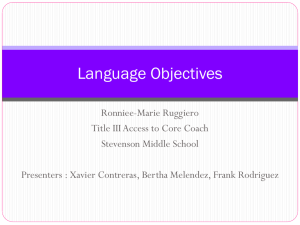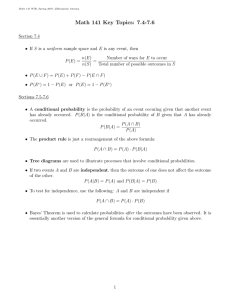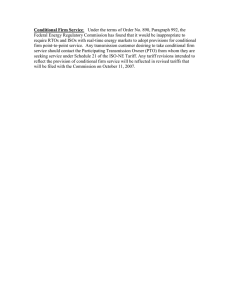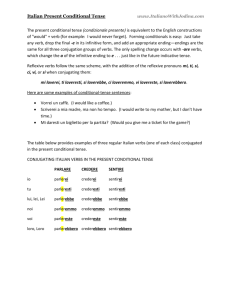Conditional Tense - Sp II
advertisement
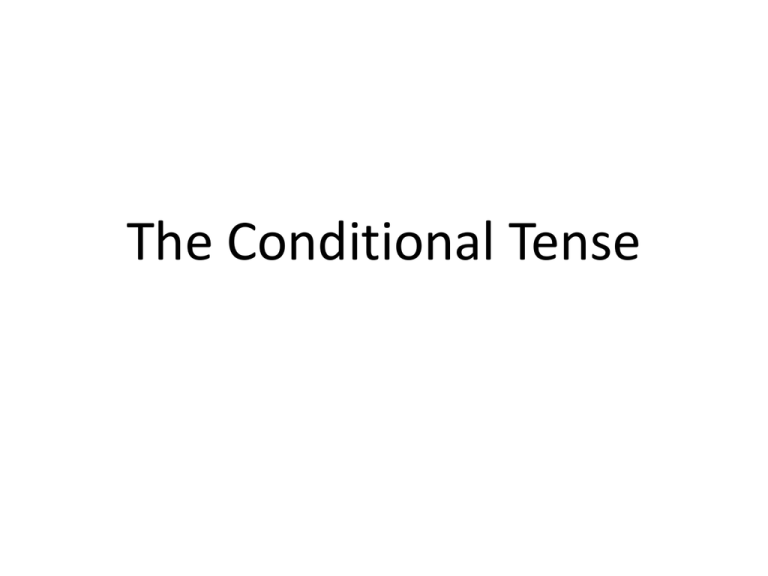
The Conditional Tense The Conditional Tense • Frequently, the conditional is used to express probability, possibility, wonder or conjecture of PAST actions, and is usually translated as would, could, must have or probably. The Conditional Tense • The student said that he would study one more hour. (probability, possibility) • What time could it have been? (wonder, conjecture) • He must have been at home. (wonder, conjecture) • We were probably busy when you called. (probability, possibility) The Conditional Tense • To conjugate regular -ar, -er and -ir verbs in the conditional, simply add one of the following to the infintive: Infinitives: llevar resolver + discutir ía ías ía íamos íais ían The Conditional Tense • Angélica discutiría la situación y resolvería el problema con nuestra ayuda. • Angelica would discuss the situation and she would resolve the problem with our help. The Conditional Tense • El alumno dijo que estudiaría una hora más. The student said that he would study one more hour. • ¿Qué hora sería? What time could it have been? • Estaría en su casa. He must have been at home. • Estaríamos ocupados cuando llamaste. We were probably busy when you called. The Conditional Tense • The same twelve common verbs that are irregular in the future tense are also irregular in the conditional tense. • Here are the infinitives and the “yo” forms of the irregular conditional tense verbs: The Conditional Tense • caber yo cabría • poner yo pondría • decir yo diría • haber yo habría • salir yo saldría • hacer yo haría poder yo podría tener yo tendría querer yo querría valer yo valdría saber yo sabría venir yo vendría The Conditional Tense • Next, let's look at some specific uses of the conditional: • To express speculation about the past: • Aquél día correrían más de veinticinco kilómetros. • That day they must have run more than 25 kilometers. The Conditional Tense • To express the future from the perspective of the past: • Yo sabía que abrirían la tienda a las siete. • I knew that they would open the store at seven o'clock. The Conditional Tense • To express hypothetical actions or events which may or may not occur: • Sería interesante estudiar chino. • It would be interesting to study Chinese. The Conditional Tense • To indicate what would happen were it not for some certain specific circumstance: • Yo viajaría pero no tengo dinero. • I would travel but I don't have money. The Conditional Tense • For polite use to soften requests: • Por favor, ¿podría decirme a qué hora abre la gasolinera? • Could you please tell me what time the gas station opens? The Conditional Tense • • • • • • To ask for advice: ¿Cuál compraría Ud.? Which one would you buy? For reported speech: Juan dijo que terminaría el trabajo. Juan said that he would finish the work. The Conditional Tense • To express what would be done in a particular situation: • ¿Hablarías inglés en España? • Would you speak English in Spain? • No. Hablaría español. • No. I would speak Spanish. The Conditional Tense • • • • • Let's look at one more use of the conditional. To express an action which is contrary to fact: Si yo tuviera tiempo, iría al cine esta noche. If I had time, I would go to the movies tonight. Note: This last example uses a verb tense you are not yet familiar with -- the imperfect subjunctive (tuviera). This topic will be covered in depth in a later lesson. The Conditional Tense • Finally, a few words need to be said to call attention to the contrasting uses of the future and the conditional. • As previously stated, the conditional is used for conjecture and to express probability with regards to a past action, as in the following example: The Conditional Tense • ¿Qué hora sería? What time could it have been? • Serían las cinco. It was probably five o'clock. The Conditional Tense • If, however, the conjecture or expression of probability is about the present, the future tense is used: • ¿Qué hora será? What time can it be? • Serán las cinco. It is probably five o'clock. The Conditional Tense • With regards to reported speech, notice that if the main clause is in the past, the conditional is used. • Juan dijo que terminaría el trabajo. • Juan said that he would finish the work. The Conditional Tense • But if the main clause is in the present, the future is used. • Juan dice que terminará el trabajo. • Juan says that he will finish the work.
